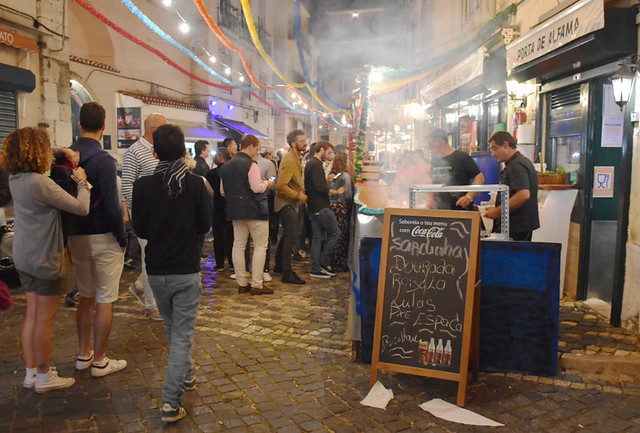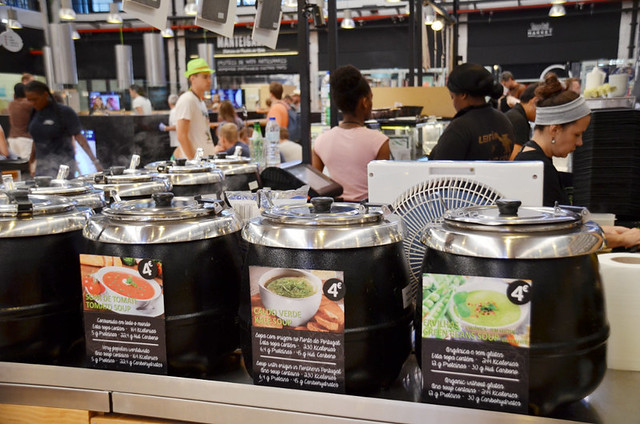What’s the connection between Lisbon and the Isle of Bute? In the last couple of days I’ve read two articles about Lisbon, and watched an episode of the Netflix show Somebody Feed Phil set in Portugal’s classy capital. Between them, they left a sweet and sour taste of Lisbon & travel writing. In two of the three, the information was presented as being provided by Lisbon experts, sharing their knowledge with travellers. In the other case, it was declared right up front there was nil knowledge of the city, just an infectuous enthusiasm to learn.
Two revealed nothing about Lisbon which couldn’t be gleaned from five minutes browsing Google, whereas the third captured the soul of the city, the friendliness of the residents, and came up with a couple of things we didn’t know.
Guess which of the above the ‘experts’ fell into?

We wouldn’t class ourselves as knowing Lisbon inside out, but numerous stays over a number of years, including putting together city guides, have left us with a decent knowledge of the place. Enough to be able to spot who churns out flim-flam material, and who produces something which has depth, is interesting, and is useful. It was exactly the same with Tenerife, a destination I can confidently say we do know extremely well.
I have a bee in my bonnet about writers who try to pass themselves off as experts, specialists in a destination, when they’ve spent less time in a location than the average traveller, or have never visited at all. It’s a deception which demeans travel writing, and sadly it is all too commonplace. Unfortunately, once stalwart names are increasingly guilty of it.

Phil Rosenthal, presenter of Somebody Feed Phil, is the sort of travel presenter we respect and enjoy watching. After telling us how little he knows, he throws himself into finding out about a destination, mainly via culinary tips shared by people who do know the destination – chefs, food writers, people who were born there, and people for whom it has become their adopted homes. The viewer learns as Phil does.
In Lisbon, Phil notched up the known and the less well known – pastéis de nata, sardines, tinned fish, prego, bacalhau – and visited tiny ethnic restaurants in narrow side streets, a ginja bar, the Time Out Market, and Michelin star eateries. His hosts showed him how Portugal’s explorer heritage influenced Lisbon’s gastronomy. It was personal and oozed detail. Where some travel articles talk vaguely of the Portuguese love of this thing called bacalhau (salt cod) Phil tried pastéis de bacalhau and bacalhau à brás.

Whether it is in an article or a TV show, it is the detail which often separates the curious traveller from the charlatan. Always the little details. For example, one of the articles I referred to at the start was a guide to when to visit Portugal. For April it advised – “spring arrives, bringing warmer temperatures and abundant sunshine in both the north and the south.”
In Portugal, like Spain, there’s a saying “em Abril, águas mil” Basically, you can expect a lot of rain in April. The entries for some other months also resulted in Carrie Mathison-type exclamations.

The other article came nicely wrapped in lovely descriptive text. But underneath the wrapping was a superficial offering. Enough meat to possibly satisfy anyone who didn’t know the city at all, but not anyone who did. And this is what these types of travel articles rely on – a lack of knowledge. In a way there’s nothing wrong with that. If a reader learns something they didn’t know, then the piece has done its job. It’s the deception, writers passing themselves off as experts when they aren’t, that niggles me. I know why it’s on the rise. Since online publications started earning money through affiliate links, people booking hotels, excursions, holidays etc. via their websites, the goal can be more to attract views rather than feed readers with unique content as a result of first-hand experience. Quality of advice, and ethics to a certain extent, are being eroded as a result. It’s not good for the credibility of the travel writing industry, and everyone in it will ultimately suffer as a result.

But what has Lisbon and the Isle of Bute got in common?
As well as the travel articles/programme about Lisbon, I saw an article in the National Geographic online which included the Isle of Bute in a list of top adventure trips. I love Bute, it’s a fabulous little island that doesn’t get the recognition it deserves. But one of the top ten places for adventure in the world? Come on.
In the space of fifty-five words, the length of the text dedicated to Bute, they managed to get two things wrong. Whoever wrote it didn’t have a clue about the island.
But hey, who’s going to spot that?




Be the first to comment